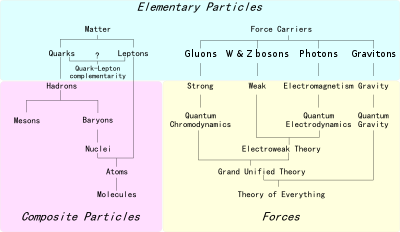
In quantum physics, a bound state is a quantum state of a particle subject to a potential such that the particle has a tendency to remain localized in one or more regions of space. The potential may be external or it may be the result of the presence of another particle; in the latter case, one can equivalently define a bound state as a state representing two or more particles whose interaction energy exceeds the total energy of each separate particle. One consequence is that, given a potential vanishing at infinity, negative-energy states must be bound. In general, the energy spectrum of the set of bound states is discrete, unlike free particles, which have a continuous spectrum.
Although not bound states in the strict sense, metastable states with a net positive interaction energy, but long decay time, are often considered unstable bound states as well and are called "quasi-bound states".[1] Examples include certain radionuclides and electrets.[clarification needed][citation needed]
In relativistic quantum field theory, a stable bound state of n particles with masses corresponds to a pole in the S-matrix with a center-of-mass energy less than . An unstable bound state shows up as a pole with a complex center-of-mass energy.
Examples[edit]
- A proton and an electron can move separately; when they do, the total center-of-mass energy is positive, and such a pair of particles can be described as an ionized atom. Once the electron starts to "orbit" the proton, the energy becomes negative, and a bound state – namely the hydrogen atom – is formed. Only the lowest-energy bound state, the ground state, is stable. Other excited states are unstable and will decay into stable (but not other unstable) bound states with less energy by emitting a photon.
- A positronium "atom" is an unstable bound state of an electron and a positron. It decays into photons.
- Any state in the quantum harmonic oscillator is bound, but has positive energy. Note that , so the below does not apply.
- A nucleus is a bound state of protons and neutrons (nucleons).
- The proton itself is a bound state of three quarks (two up and one down; one red, one green and one blue). However, unlike the case of the hydrogen atom, the individual quarks can never be isolated. See confinement.
- The Hubbard and Jaynes-Cummings-Hubbard (JCH) models support similar bound states. In the Hubbard model, two repulsive bosonic atoms can form a bound pair in an optical lattice.[2][3][4] The JCH Hamiltonian also supports two-polariton bound states when the photon-atom interaction is sufficiently strong.[5]
https://en.wikipedia.org/wiki/Bound_state




No comments:
Post a Comment